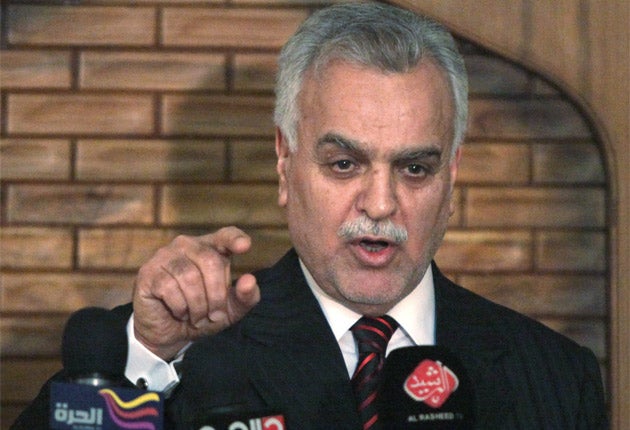Vice-President's veto darkens Iraq election

Your support helps us to tell the story
From reproductive rights to climate change to Big Tech, The Independent is on the ground when the story is developing. Whether it's investigating the financials of Elon Musk's pro-Trump PAC or producing our latest documentary, 'The A Word', which shines a light on the American women fighting for reproductive rights, we know how important it is to parse out the facts from the messaging.
At such a critical moment in US history, we need reporters on the ground. Your donation allows us to keep sending journalists to speak to both sides of the story.
The Independent is trusted by Americans across the entire political spectrum. And unlike many other quality news outlets, we choose not to lock Americans out of our reporting and analysis with paywalls. We believe quality journalism should be available to everyone, paid for by those who can afford it.
Your support makes all the difference.Iraq's Sunni Arab Vice-President yesterday vetoed an election law over the number of parliamentary seats for refugees, prompting poll workers to halt preparations and casting fresh doubt on whether the vote can be held in January.
Tareq al-Hashemi said his veto of one article of the law was unlikely to delay the poll. But the Vice-President's actions were likely to open the door to a fresh round of political debate over the legislation that only won parliamentary approval after protracted wrangling.
Any material delay to the ballot, planned for between 18 and 23 January, could affect US plans to end combat operations next August, ahead of a full pullout by the end of 2011.
"I did not veto the whole law. I have vetoed the first article of the law and I think parliament will understand my stance," Mr Hashemi, below, told a news conference. "My suggested amendment is to give justice to all Iraqis living abroad, not just Iraqis displaced in neighbouring countries."
Many Iraqis abroad are, like Mr Hashemi, members of Iraq's once-dominant Sunni Muslim community. Many of them fled when the country descended into sectarian warfare after the Sunni dictator Saddam Hussein was ousted in the 2003 US-led invasion, propelling Iraq's Shia majority to political dominance.
Prime Minister Nouri al-Maliki, a Shia, rebuked Mr Hashemi and said his move was "a serious threat to the democracy and political process" in Iraq. He urged the election commission to continue poll preparations.
Iraq's electoral commission, which had already complained it has little time to prepare for the elections, said however that it had suspended its work.
Mr Hashemi, one of Iraq's two vice- presidents and part of a presidential council that has veto power over legislation, said he had sent the law back to parliament after objecting to the first article because it did not give a voice to Iraqis abroad.
The electoral law allocates 5 per cent of the 323 seats in the next parliament to minorities, such as Christians, and to Iraqis displaced from their homes. But it does not spell out how the 2 million Iraqi refugees estimated to be living abroad will be represented.
Mr Hashemi wants 15 per cent of parliamentary seats for minorities and Iraqis displaced internally and abroad. He said the issue could be resolved in a single session of parliament and that electoral authorities should continue preparing without any expectation of a delay in the poll date.
But other politicians, wary of parliamentary squabbling over the issue, were sceptical. "The election law veto threatens the whole political process, and the presidency council's responsibility is to safeguard the constitution – not to push the country into a dark tunnel," Haidar al-Ibadi, an influential MP from Mr Maliki's Dawa party, told state television.
The election date had already been in question for weeks because of a dispute pitting ethnic Kurds against Arabs and Turkmen on how to conduct the vote in the northern city of Kirkuk, which Kurds claim as their ancestral home. The differences were ironed out 10 days ago following pressure from the United Nations and US officials.
Join our commenting forum
Join thought-provoking conversations, follow other Independent readers and see their replies
Comments